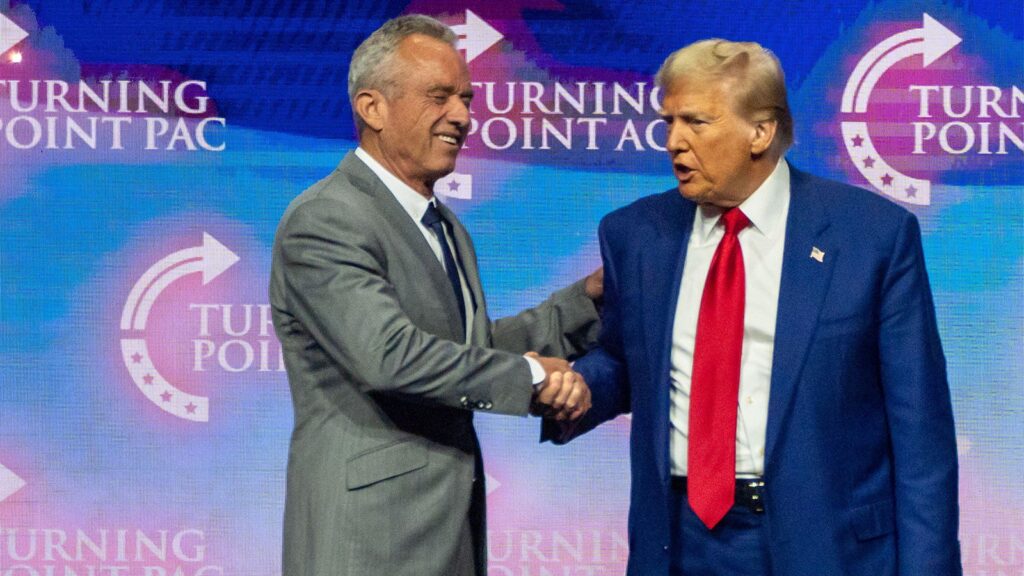WASHINGTON — Lawmakers on opposite sides of the aisle shared clashing views on the potential impacts of a second Trump administration on trust in science and public health during a discussion hosted by The Hill on Thursday.
Rep. Kim Schrier, MD (D-Wash.), said her greatest concerns include the possible use of executive orders to strip Congress of power, which could be further enabled by the current conservative-leaning Supreme Court, as well as the future of vaccines in an era of misinformation.
“I think it’s fine to have questions,” said Schrier, who is a pediatrician, adding that the problem is that some people intentionally spread disinformation about ideas that have already been disproven.
“We have, potentially, a future secretary of Health and Human Services who is sowing doubts, bringing up questions that have been long settled by massive studies,” she said, referring to Trump’s pick, Robert F. Kennedy Jr.
Steve Scully, the panel’s moderator and contributing editor at The Hill, noted that Kennedy refers to himself as a vaccine “skeptic” and not a “vaccine denier.”
“In my mind, that’s disqualifying enough,” Schrier replied. “I mean, if you’re a skeptic about something that has … been proven to save countless lives … just sowing that doubt, that is so irresponsible.”
She noted that to combat this misinformation, people need to understand how to vet sources, and many Americans don’t. “That’s why we are seeing conspiracy theories flying, and people believe the scary stuff,” she said. They also don’t understand that science evolves over time, she added.
Schrier said she is also particularly nervous about the possibility of scientists leaving healthcare agencies, pointing to threats Kennedy made against career scientists and researchers at government health agencies.
While Congress does have the ability to push back on anti-science views, Schrier said that’s not entirely reassuring given what she witnessed during the COVID-19 pandemic.
“There’s checks and balances, and there is a lot of bipartisanship in our particular committee — the Energy and Commerce Committee — but facts are facts. And sometimes I think we just shouldn’t have separate staff for each party, that we should have a set of staff, a set of facts, that we all operate from, and then I think we would have a whole lot more agreement,” she said.
However, in a separate panel discussion, Larry Bucshon, MD, a former congressman (R-Ind.) and cardiothoracic surgeon, who is now a senior policy advisor for Holland & Knight, a multinational law firm, said, “I think that you’ll see consistency across all of these agencies.”
While there are a lot of political appointees, there are also a lot of career staff at the sub-cabinet level with “deep experience,” and they will be able to advise cabinet-level secretaries on policies, he added.
Bucshon did appear to agree with Kennedy’s plan to focus on making Americans healthier. “The big public health challenge … is we’ve not done well on funding preventative care,” he said, adding that keeping people healthy also helps the economy, as it enables productive members of the workforce.
Asked what political leaders, advocates, and civil service employees can do, he urged them to “be more engaged than ever.”
“You don’t have to run for Congress if you’re a doctor, but you should be engaged with your local political figures, your local public health departments,” he noted.
Bucshon also encouraged advocates and others to try to make an impact at the state and local levels “because ultimately, what influences members of Congress is the people they represent.”
When asked by MedPage Today after the panel whether he thought the Vaccines for Children program might lose funding under the Trump administration or whether committees that advise health agencies on vaccines could potentially be disbanded, Bucshon said, “I just don’t think that there would be support for that in Congress,” and suggested that lawmakers could serve as one level of defense against ideas that might be contrary to science.
Please enable JavaScript to view the comments powered by Disqus.
Source link : https://www.medpagetoday.com/publichealthpolicy/washington-watch/113818
Author :
Publish date : 2025-01-16 22:45:28
Copyright for syndicated content belongs to the linked Source.
